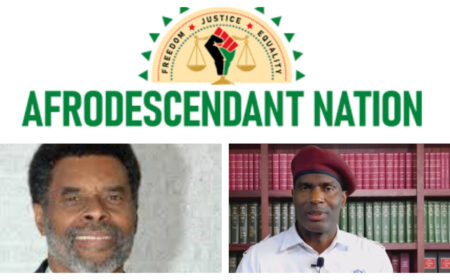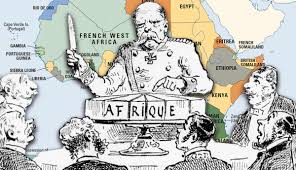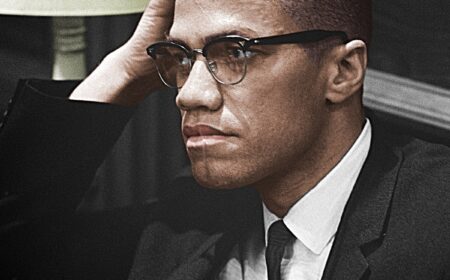‘Destroy This Temple’ Re-Release Highlights International Reach of Black Power Movement
by Sam P.K. Collins December 6, 2022

At a time when any mention of Black Panther brings to mind King T’Challa, Princess Shuri and other fictional characters, the re-release of a Black Power-era book provides an opportunity to reaffirm the global reach and lasting impact of a mid-20th-century Pan-African liberation movement.
In “Destroy This Temple: The Voice of Black Power in Britain,” the late Nigerian-born novelist-playwright Obi Egbuna Sr. explained the meaning of Black Power in the context of his experiences organizing with the Black Panther Party in the United Kingdom.
“Destroy This Temple,” reprinted by Paul Coates’ Black Classic Press, also delves into the late Egbuna’s travels to the United States and what he describes as a life-changing meeting with Nation of Islam leader Elijah Muhammad.
Egbuna released “Destroy This Temple” in the early 1970s. He wrote the book while facing trial in Brixton for an alleged plot to murder police officers. This book counted among more than a dozen non-fiction books, novels and short stories Egbuna wrote during his life.
In reflecting on “Destroy this Temple,” Obi Egbuna Jr., a D.C.-based Pan-African journalist-educator-playwright and Egbuna’s namesake described it as the ideal tool for reinforcing Africans’ collective need for self-determination.
“When you go back to [the source], it becomes clear that African people made nationalism beautiful and that’s a contribution to world peace that we should never overlook,” said Egbuna Jr.
“Before what we did, nationalism was associated with fascists, rapists, thieves and plunderers,” Egbuna Jr. continued.
“We brought a brand of nationalism that showed the world it is noble, brave and just good for people to take back what belongs to them, from their names, the language to their land. That’s what Black Power represents and that’s what you’re going to get in this book.”
Expanding an Understanding of Black Power
On Friday, an international group of political organizers, artists, educators and children gathered virtually to celebrate “Destroy this Temple.”
The event served as a history lesson of sorts, with comments from Black Power pioneer Mukasa Dada and poems from Egbuna Jr. and the children of the Thomas Sankara Centre in Burkina Faso.
Antone White and Eric Hicks, two returning citizens from the District, also received recognition for their mastery of the law to secure their early prison release after serving nearly three decades of a life sentence.
During other heartfelt moments, Samia Nrkumah, daughter of Kwame Nkrumah, Ghana’s first post-independence president, expressed her father’s vision for global African unity.
Maria Jones, Ayanna Gregory and Bokar Ture, children of the late Amiri Baraka, Dick Gregory and Kwame Ture respectively, also provided pre-recorded comments about the late Ebguna’s impact on African liberation movements of the Black Power era.
Historians often associate the term “Black Power” with Dada and most especially Ture, who, as a leader of the Student Nonviolent Coordinating Committee, popularized the slogan that ramped up an international movement against institutionalized racism.
Both Ture and Egbuna Sr. established a relationship with Nkrumah, who they regarded as the father of Black Power due to his insistence on manifesting the United States of Africa.
In 2014, Egbuna Sr. passed away in the District at the age of 75. Friends, family and community members gathered at Howard University’s Rankin Memorial Chapel to honor his life. Schomburg Center for Research in Black Culture has copies of Egbuna Sr’s papers.
Years prior, Egbuna Jr., followed in his father’s footsteps, using his platform as an educator and playwright to provide historical analyses that connect seemingly isolated figures and events.
Those efforts extended to the re-release of “Destroy This Temple,” which not only includes a foreword from Ebguna Jr. but commemorates the 50th anniversary of Nkrumah’s death and the 100th anniversary of Guinean President Ahmed Sekou Toure’s birth.
Coates, who recalled selling copies of the original version of “Destroy This Temple,” said the book inspired him to further examine Black liberation movements in other parts of the world.
“Coming out of struggle in this country, there is and was a tendency for many of us to African-American-centric in our thinking,” Coates said.
“Obi Egbuna Sr.’s book was one of the first pieces that introduced me to Black people out of this country struggling in the same vein like the Black Panthers did in this country,” he continued.
“This narrative is standalone in the sense that he’s talking about Black Power in the United Kingdom and his experience in a Pan-African sense.”
A Call to Action
In his comments on Dec. 2, Dada extolled Egbuna Jr.’s work in connecting with oppressed people in Cuba, Venezuela and Nicaragua, as well as Zimbabwe and other parts of Africa.
He expressed his hope that readers of “Destroy This Temple” would be inspired to do the same.
“I’m honored that we got a document to let people know that Black power historically started and has continued to be a global movement that’s linked to other liberation movements,” Dada said.
“Black Power makes that link and it’s definitely part of the socialist revolution. Let us continue to march forward for the liberation of Africa.”
Samia Nkrumah channeled the energy of her late father when she gave a charge to audience members.
“Our unity will not only be economic,” Nkrumah said. “We want a unity based on a solid political basis that’s comprehensive. I hope to see the day that Africans from everywhere in the world can contest elections on African soil [and] will have citizenship and be able to vote and be part of our decision-making.
“When that happens, we’ll know that truly Africans everywhere are part of the African continent,” she said.
Sam P.K. Collins
Sam P.K. Collins has more than a decade of experience as a journalist, columnist and organizer. Sam, a millennial and former editor of WI Bridge, covers education, police brutality, politics, and other aspects of the diasporic Black experience. This journey has been inspired by his experiences growing up, attending college and serving as an educator in the nation’s capital. Also of significance to Sam’s professional and personal development in the Black Press is his adherence to the “race first” philosophy espoused by the Honorable Marcus Mosiah Garvey and many others.




